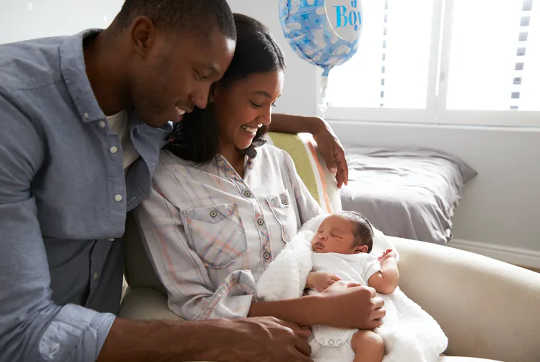
Many new parents often feel they have to hide how they really feel. Monkey Business Images/ Shutterstock
If you believe what the media tells us, we should feel nothing apart from overwhelming love, gratitude and excitement immediately when our baby is born. Although becoming a new parent might indeed be a time of happiness, feeling a far more complex array of emotions is actually more common than you might think.
Research shows that overall happiness actually drops in the first year of having a baby, especially for women. Although parents may love their babies very much, it’s common to not love the things that come alongside it, such as money worries, sleepless nights and feeling disconnected from your partner or friends.
However, parents often hide how they really feel, believing these thoughts are wrong, and that sharing them would have them labelled a “bad parent”. Worries such as this can be a core part of not feeling like a good enough parent and are also common in postnatal depression.
The mental health of new parents and the unexpected things that can happen in the first year of parenting is the subject of my latest book. I spoke with more than 500 parents who told me how they honestly felt after their baby was born.
What was immensely clear from their stories is that there’s no one “right way” to feel once you have a baby. Alongside the positives, parents felt a whole host of emotions they weren’t expecting, often saying this was the first time they had spoken openly about their feelings. Here were some of the most common things people felt:
1. Not loving your baby instantly
The media would have us believe that the moment a baby is born, parents fall madly in love with them. Although this can happen, many parents talked about feeling disconnected or so exhausted they couldn’t think about loving anyone.
Others felt shock that a baby was actually here. It can be especially difficult when parents have had a traumatic pregnancy or birth, IVF or previous loss, or premature baby.
It’s normal for bonding to take time. However, things like skin to skin contact, holding your baby closely in a sling, or even a giving them a gentle baby massage are all shown to help improve bonding – and mental health.
2. Feeling incompetent and overwhelmed
Another common emotion was feeling terrified by the responsibility of being a new parent. Many felt shocked that they were now actually expected to care for this baby, despite no tests or training. Parents remembered feeling like everyone else knew what to do, but they didn’t. This feeling is likely exacerbated by us now having babies later, living away from family, and often not really being around babies until we have our own.
But many people feel this way. And babies are resilient, so it’s okay if you don’t do everything “perfectly” all the time.
 It’s normal to feel overwhelmed. JR-50/ Shutterstock
It’s normal to feel overwhelmed. JR-50/ Shutterstock
If you’re feeling this way, talking to other new parents or with your health visitor or midwife may help reassure you of just how common these feelings are. However, if these thoughts are affecting you significantly, do consider talking to a therapist who specialises in supporting new parents.
3. Grieving for your former life
The build-up to having a baby is often all about the birth and buying things for the baby. When the baby arrives, your life suddenly changes.
It’s normal to be shocked, feel regret at how tough some parts can be, and to grieve for your old life – even though you wouldn’t actually swap back to it. Part of this, especially for mothers, was feeling like they’d lost their identity and simply becomes someone’s “mum”, their days filled with caring for their baby on repeat.
But missing your old life does not mean you don’t love your baby or are a bad parent. And it does get easier over time as you transition into your new normal.
4. Feeling trapped – but not wanting to be separated
Parents also talked about wanting a break while simultaneously not wanting to be separated from their baby.
Mothers talked about jealousy of their partner leaving the house for work, yet dreaded being separated from their baby to do the same. Some counted down the clock until bedtime and then immediately missed their baby. You might find people get exasperated at you for feeling this way – ignore them. You don’t have to leave your baby if you don’t want to. What you probably need is more support in other ways, such as a hot meal, a nap or simply some adult company.
If you’re a new parent and struggling, it’s important to remember that negative and mixed emotions are a normal part of life. Talking to other parents may help you see you aren’t alone in feeling this way. Having negative emotions about people and the things we love is also normal. And, perhaps most importantly, people lie on social media. Research shows it’s common for new parents to feel they have to share positive messages to the point they embellish or even lie to create a certain image to the world. Let’s not fall for it any more.
Altogether, what was clear from my research was the complexity and variability in what parents felt. Emotions could change from one moment to the next, or come all at once. Being a parent certainly isn’t easy – and parents should know that it’s okay to feel this way.![]()
About the Author
Amy Brown, Professor of Child Public Health, Swansea University
This article is republished from The Conversation under a Creative Commons license. Read the original article.

Related Books:
Here are 5 non-fiction books on parenting that are currently Best Sellers on Amazon.com:The Whole-Brain Child: 12 Revolutionary Strategies to Nurture Your Child's Developing Mind
by Daniel J. Siegel and Tina Payne Bryson
This book provides practical strategies for parents to help their children develop emotional intelligence, self-regulation, and resilience using insights from neuroscience.
Click for more info or to order
No-Drama Discipline: The Whole-Brain Way to Calm the Chaos and Nurture Your Child's Developing Mind
by Daniel J. Siegel and Tina Payne Bryson
The authors of The Whole-Brain Child offer guidance for parents to discipline their children in a way that promotes emotional regulation, problem-solving, and empathy.
Click for more info or to order
How to Talk So Kids Will Listen & Listen So Kids Will Talk
by Adele Faber and Elaine Mazlish
This classic book provides practical communication techniques for parents to connect with their children and foster cooperation and respect.
Click for more info or to order
The Montessori Toddler: A Parent's Guide to Raising a Curious and Responsible Human Being
by Simone Davies
This guide offers insights and strategies for parents to implement Montessori principles at home and foster their toddler's natural curiosity, independence, and love of learning.
Click for more info or to order
Peaceful Parent, Happy Kids: How to Stop Yelling and Start Connecting
by Dr. Laura Markham
This book offers practical guidance for parents to shift their mindset and communication style to foster connection, empathy, and cooperation with their children.

























